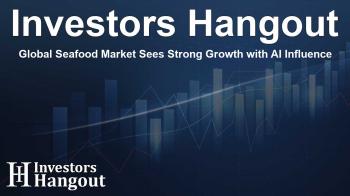Global Seafood Market Sees Strong Growth with AI Influence

Steady Growth of the Global Seafood Market
The global seafood market is on track for significant growth, expected to expand by USD 150.04 billion from 2024 to 2028. This growth is fueled by rising consumer awareness about healthy nutrition and the increasing shift towards online retailing in the seafood industry. The predicted compound annual growth rate (CAGR) sits at an impressive 13.55% during this period, indicating a robust market movement.
Key Players Influencing the Market
Prominent players in the seafood market include companies such as Aker BioMarine ASA, Austevoll Seafood ASA, Cooke Aquaculture Inc., and Trident Seafoods Corp. These companies are investing in innovative technologies and sustainability efforts that will redefine the market landscape. The commitment of these organizations not only addresses the increasing demand for seafood but also aligns with better environmental practices.
Market Trends Driving Growth
The seafood industry serves as a vital protein source worldwide. Increased awareness regarding the health benefits of seafood is encouraging a rise in consumption levels. Consumers are influenced by the health advantages of seafood, which includes essential omega-3 fatty acids, vitamins, and minerals. The challenge remains in balancing accessibility and affordability, with fresh and frozen seafood options catering to diverse budgets.
Additionally, the hospitality industry continues to thrive on seafood. The rise of culinary experimentation means there is a growing demand for high-quality seafood, leading to product innovation. Exciting trends such as 3D printing technology and an emphasis on alternative protein sources are reshaping market offerings, allowing for personalized products.
Challenges Facing the Seafood Industry
Despite the optimistic growth projections, several challenges loom over the seafood market. Price volatility remains a pressing issue, heavily influenced by tourism trends and overall demand. Furthermore, the depletion of fish stocks due to overfishing poses serious threats to sustainability. Overfishing not only jeopardizes the ocean ecosystem but also impacts livelihoods, particularly in communities that rely on fishing.
Understanding Consumer Preferences
In recent years, a marked shift towards sustainable, ethically sourced seafood has emerged. Consumers express a growing preference for leaner fish such as salmon and tuna, as well as crustaceans like shrimp and lobster. Certifications from organizations like the Aquaculture Stewardship Council advocate for responsible sourcing and sustainability within the industry.
Moreover, lean fish varieties rich in omega-3 fatty acids have notable health benefits, propelling consumer demand. The seafood industry is also adjusting to trends such as Brexit and its effect on the import/export dynamics, which could further complicate market accessibility.
Embracing Technology and Innovation
The digital revolution has reshaped the retail landscape, particularly in the seafood sector. The increase in e-commerce is a vital growth driver, with online sales presenting significant opportunities for suppliers to expand market reach and foster deeper customer relations. The rise of online platforms allows manufacturers to showcase their products and enables consumers to discover seafood items more conveniently.
AI technology is at the forefront of this evolution, with applications improving operational efficiency and market growth strategies. AI-driven analytics provide insights that allow companies to adapt to changing consumer demands and streamline processes.
Future Perspectives for the Seafood Market
The projections for the seafood market signal a promising future rich with potential. Striking a balance between innovative practices, environmental sustainability, and addressing consumer preferences will be crucial for ongoing growth. As younger generations prioritize healthy eating and ethical sourcing, companies must remain agile and responsive to these shifts in culinary trends.
In conclusion, the global seafood market presents a dynamic landscape influenced heavily by consumer habits, technological advancements, and sustainability considerations. With all of these aspects aligning, there is a clear path towards growth that benefits producers, consumers, and the environment alike.
Frequently Asked Questions
What factors are driving growth in the seafood market?
Growth is largely driven by rising health awareness, increasing online retailing trends, and a focus on sustainability and ethical sourcing practices.
Which companies are key players in the seafood market?
Major players include Aker BioMarine ASA, Austevoll Seafood ASA, Cooke Aquaculture Inc., and Trident Seafoods Corp., among others.
What challenges does the seafood industry face?
The industry confronts various challenges such as price volatility, stock depletion due to overfishing, and the need for sustainable practices.
How is technology impacting the seafood market?
Technology, particularly AI, enhances operational efficiency, improves market strategies, and facilitates new sales avenues through e-commerce.
What are the consumer trends in seafood preferences?
Consumers increasingly prefer lean fish and sustainable seafood, driven by awareness of health benefits and ethical sourcing practices.
About Investors Hangout
Investors Hangout is a leading online stock forum for financial discussion and learning, offering a wide range of free tools and resources. It draws in traders of all levels, who exchange market knowledge, investigate trading tactics, and keep an eye on industry developments in real time. Featuring financial articles, stock message boards, quotes, charts, company profiles, and live news updates. Through cooperative learning and a wealth of informational resources, it helps users from novices creating their first portfolios to experts honing their techniques. Join Investors Hangout today: https://investorshangout.com/
Disclaimer: The content of this article is solely for general informational purposes only; it does not represent legal, financial, or investment advice. Investors Hangout does not offer financial advice; the author is not a licensed financial advisor. Consult a qualified advisor before making any financial or investment decisions based on this article. The author's interpretation of publicly available data shapes the opinions presented here; as a result, they should not be taken as advice to purchase, sell, or hold any securities mentioned or any other investments. The author does not guarantee the accuracy, completeness, or timeliness of any material, providing it "as is." Information and market conditions may change; past performance is not indicative of future outcomes. If any of the material offered here is inaccurate, please contact us for corrections.
